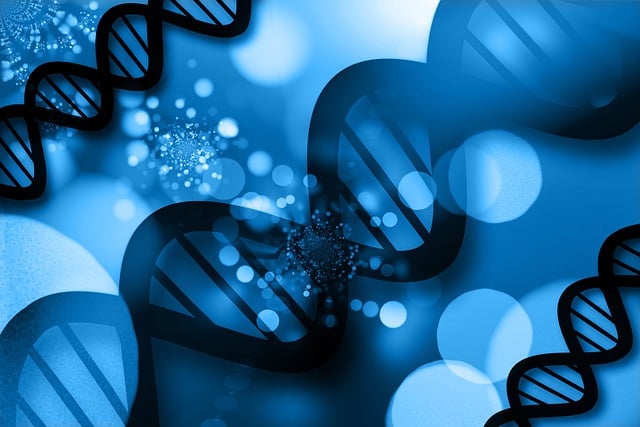NAD+, a coenzyme vital for cellular rejuvenation and metabolism, plays a crucial role in maintaining DNA stability. As NAD+ levels decrease with age, it contributes to cellular dysfunction and increased cancer risk. Enhancing NAD+ through supplements or dietary changes shows promise in boosting DNA repair mechanisms, protecting against mutational damage, and potentially preventing cancer by supporting enzymes that fix DNA damage. Research highlights NAD+'s dual role as an antioxidant and energy producer, positioning it as a promising target for cancer prevention and treatment strategies focused on cellular rejuvenation.
“NAD+, or nicotinamide adenine dinucleotide, is emerging as a powerful molecule in the realm of cellular rejuvenation and cancer prevention. This vital coenzyme plays a crucial role in maintaining DNA stability—a key factor in warding off the development and progression of cancer. In this article, we explore how NAD+ acts as a potent anti-cancer agent, delving into its ability to enhance DNA repair mechanisms and its promising clinical evidence, positioning it as a potential game-changer in cancer prevention strategies.”
Understanding NAD+: The Key to Cellular Rejuvenation
NAD+, or nicotinamide adenine dinucleotide, is a coenzyme found in all living cells that plays a crucial role in energy production and metabolism. Often referred to as the “key to cellular rejuvenation,” NAD+ is essential for maintaining optimal cell function and regulating DNA repair processes. As we age, our body’s natural levels of NAD+ tend to decrease, leading to cellular dysfunction and increased susceptibility to diseases like cancer.
By enhancing NAD+ levels through dietary supplements or other means, researchers believe that it may be possible to bolster DNA stability and protect against mutational damage. This potential mechanism has sparked significant interest in the role of NAD+ for cancer prevention. Studies suggest that maintaining healthy NAD+ levels can promote genomic stability by supporting DNA repair enzymes, thereby reducing the likelihood of cellular abnormalities and tumor development.
Cancer Prevention: A Role for DNA Repair Mechanisms
Cancer prevention is a multifaceted process, and one of its critical components is maintaining DNA stability. The human body possesses intricate repair mechanisms designed to fix DNA damage, ensuring genetic integrity. These repair systems are essential in preventing the accumulation of mutations that can lead to cancerous cell growth. One fascinating aspect of recent research is exploring how NAD+ for cellular rejuvenation can play a role in enhancing these DNA repair mechanisms.
NAD+, or nicotinamide adenine dinucleotide, is a coenzyme found in every cell of our bodies. It is involved in various cellular processes, including energy production and DNA repair. Studies suggest that boosting NAD+ levels through dietary changes or supplements may support the body’s natural defense against cancer. By enhancing DNA repair pathways, NAD+ for cellular rejuvenation could potentially reduce the risk of genetic mutations, thus acting as a proactive measure in cancer prevention.
How NAD+ Supports DNA Stability and Integrity
NAD+, or nicotinamide adenine dinucleotide, plays a pivotal role in maintaining DNA stability and integrity as it is essential for various cellular processes including DNA repair and gene expression regulation. As a key coenzyme in metabolism, NAD+ facilitates the production of energy by supporting the electron transport chain, ensuring cells have the power to carry out crucial functions like DNA replication and transcription accurately. This, in turn, reduces the likelihood of mutations that can lead to cancer development.
Moreover, NAD+ acts as a cellular antioxidant, neutralizing free radicals that can cause oxidative stress and damage DNA. By enhancing these protective mechanisms, NAD+ for cellular rejuvenation becomes a promising strategy in cancer prevention. Its dual role in energy metabolism and DNA protection makes it an intriguing target for research into the prevention and potential treatment of cancer.
Exploring Clinical Evidence: NAD+ and Its Anti-Cancer Effects
The potential of NAD+ (nicotinamide adenine dinucleotide) as a cancer prevention strategy has gained significant interest in recent years, primarily due to its role in cellular rejuvenation and DNA repair mechanisms. Clinical evidence suggests that NAD+ deficiency is linked to various types of cancer, indicating its importance in maintaining genomic stability. Research highlights the anti-cancer effects of NAD+ supplementation, including the inhibition of tumor growth and angiogenesis, as well as the induction of apoptosis (programmed cell death) in cancer cells.
Several studies have explored the mechanisms behind these effects, revealing that NAD+ plays a crucial role in regulating cellular metabolism, DNA repair, and epigenetic modifications. By enhancing NAD+ levels, particularly through dietary supplementation or activators of NAD+ biosynthesis, researchers aim to counteract the metabolic changes associated with cancer development. This approach holds promise for not only preventing cancer but also improving the effectiveness of traditional treatments by supporting overall cellular health and DNA stability.
NAD+, recognized as the key to cellular rejuvenation, plays a promising role in cancer prevention through its ability to enhance DNA stability. By supporting efficient DNA repair mechanisms, NAD+ contributes to maintaining genetic integrity, a crucial aspect in deterring tumor formation. Clinical evidence suggests that NAD+ supplementation could be a potent strategy against cancer, offering a natural approach to strengthen the body’s defense against this disease. Further research into the anti-cancer effects of NAD+ holds significant potential for developing innovative cancer prevention and treatment methods.
